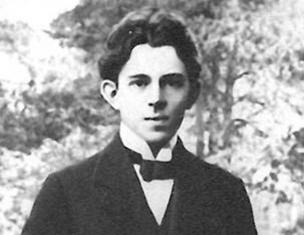“I will repeat on the eve of separation...” Marina Tsvetaeva
I will repeat on the eve of separation,
At the end of love
That I loved these hands
Your bossesAnd the eyes of - someone - someone
They don’t give you a glance! —
Requiring a report
For a casual glance.All of you and your damned one
Passion - God sees! -
Demanding retribution
For an accidental sigh.And I’ll say it again wearily,
- Don’t rush to listen! -
What did your soul do to me?
Across the soul.And I’ll also tell you:
- It’s still eve! -
This mouth before the kiss
Yours was young.Look to look - bold and bright,
Heart - five years old...
Happy who didn't meet you
On my way.
Analysis of Tsvetaeva’s poem “I will repeat on the eve of separation...”
In 1914, married Tsvetaeva met the poetess and translator Sofia Yakovlevna Parnok. She was seven years older than Marina Ivanovna, was distinguished by her capriciousness, irony, intelligence, and had an unusual appearance. In 1907, she married Vladimir Mikhailovich Volkenstein, but did not live with him for too long. After an unsuccessful marriage, Parnok began to pay attention exclusively to women. The poetess charmed Tsvetaeva literally from the first meeting. Soon after meeting, an affair began between Marina Ivanovna and Sofia Yakovlevna. They did not hide their relationship from the public. Moreover, they often acted demonstratively, openly, for show, as evidenced by the memoirs of contemporaries. At the same time, Tsvetaeva did not intend to file for divorce from her legal husband, Sergei Yakovlevich Efron. Relatives knew about her betrayal, but preferred to stay away. The romance between the two poetesses did not last long - in 1916 the women separated. Marina Ivanovna returned to her husband. She later called her relationship with Parnok “the first disaster in her life.”
Tsvetaeva dedicated a short series “Girlfriend” to Sofia Yakovlevna. It includes the poem “I will repeat on the eve of separation...”, written at the end of April 1915. His lyrical heroine paints a not very attractive portrait of her beloved - domineering hands, a demand for an account even for an accidental glance, a passion called damned. Readers are presented with a strong, despotic woman who clearly plays the main role in the couple and leads the partner. Approximately in the middle of the poem, a bright, memorable image appears that well characterizes a relationship that is not just tired, but dried dry, exhausted:
...That your soul stood up to me
Across the soul.
This painful novel made the lyrical heroine truly grown up. Before the kiss with the mistress described in the text, her mouth was young, her heart was no older than five years, her gaze was “bold and bright.” The most terrible lines of the poem are the final ones. No one would like to hear such words from a once near and dear person. The heroine proclaims happy all those who did not meet her friend on their way.
I will repeat on the eve of separation,
At the end of love
That I loved these hands
The powers that be are yours.
And the eyes of - someone - someone
They don’t give you a glance! -
Requiring a report
For a casual glance.
All of you and your damned one
Passion - God sees! -
Demanding retribution
For an accidental sigh.
And I’ll say it again wearily,
Don't rush to listen! -
What did your soul do to me?
Across the soul.
And I’ll also tell you:
It’s still eve! -
This mouth before the kiss
Yours was young.
The look - to the look - is bold and bright,
Heart - about five years old...
Happy who didn't meet you
On my way.
Marina Tsvetaeva, April 1915
In 1914, Marina Tsvetaeva met the poetess and translator Sofia Parnok.
She was seven years older than Marina Ivanovna, was distinguished by her capriciousness, irony, intelligence, and had an unusual appearance. After an unsuccessful marriage, Parnok began to pay attention exclusively to women.
The poetess charmed Tsvetaeva literally from the first meeting. Soon after meeting, an affair began between Marina Ivanovna and Sofia Yakovlevna. They did not hide their relationship from the public.
Moreover, they often acted demonstratively, openly, for show, as evidenced by the memoirs of contemporaries. At the same time, Tsvetaeva did not intend to file for divorce from her legal spouse, Sergei Yakovlevich Efron.
Relatives knew about her betrayal, but preferred to stay away. The romance between the two poetesses did not last long - in 1916 the women separated. Marina Ivanovna returned to her husband.
She later called her relationship with Parnok “the first disaster in her life.”
Tsvetaeva dedicated a short cycle “Girlfriend” to Sofia Yakovlevna. It includes the poem “I will repeat on the eve of separation...”, written at the end of April 1915.
A not very attractive portrait of his beloved - imperious hands, a demand for an account even for an accidental glance, a passion called damned. A strong, tyrannical woman, who clearly plays the main role in the couple, leads the partner.
The most terrible lines of the poem are the final ones. No one would like to hear such words from a once near and dear person. The poetess proclaims happy all those who did not meet her friend on their way.
After the breakup, Marina Tsvetaeva did not want to hear anything about Sofia Parnok, and even reacted rather coldly to the death of her former lover, who died in 1933.
This is the amazing story of one poem by the amazing Marina Tsvetaeva!







